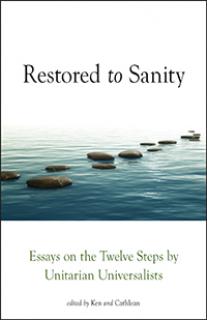Transformative Stories: UUs and 12 Step Recovery Programs
By Gail Forsyth-Vail
Addiction touches many Unitarian Universalist families, congregations, and communities. We know the pain addiction can cause, not only for an individual, but for those around them. We have seen the tenacity required to sustain recovery.
Many of us have heard—or discovered for ourselves—that 12 Step programs offer an important source of recovery support. Recovering addicts and alcoholics testify to a refreshed sense of purpose, healed relationships, and new ability to make space for the holy in their lives. Their parents, partners, children, and siblings speak of supportive community that helps them hold their worry about a loved one, anticipate both the challenges and joys of recovery, and learn to detach as appropriate for self-care. Stories from recovery are stories of transformation, not as a sudden event, but as a long-haul practice. Their power for religious liberals is hard to miss.
However, as a Unitarian Universalist, I have at times struggled with the theology that undergirds 12 Step programs. At first brush, a theology that speaks of brokenness, powerlessness, and surrender to a higher power seems incompatible with our faith that affirms that we are made in the image of God, with worth, dignity, and capacity for goodness as a birthright. Yet, I have known people of many theologies, including humanists and atheists, whose lives have been turned around by 12 Step programs.
I eagerly awaited the recent publication of Restored to Sanity: Essays on the Twelve Steps by Unitarian Universalists (Skinner House, 2014). Edited by Ken and Cathlean (first names only, as is 12 Step practice), it collects deeply personal stories from Unitarian Universalists for whom participating in a 12 Step program is an important spiritual practice. Two different essays delve into each of the twelve steps as each author recounts their own experience. To read the essays is to engage with complex stories of people struggling with addiction; each story is unique in its details and its particular way of lifting up hope, courage, and resilience. Together, the essays illuminate how Unitarian Universalist values and faith work with 12 Step programs to promote wholeness in those who practice.
The book is an extraordinary gift to our faith communities and the religious professionals who serve them, and to our people, both within and beyond UU congregations. May these essays, heartfelt gifts shared by Unitarian Universalists in recovery, help inspire others to be “restored to sanity.”
Next Steps!
Add Restored to Sanity: Essays on the Twelve Steps by Unitarian Universalists to your professional or family library.
Explore resources on the Unitarian Universalist Addictions Ministry website. If you are a religious professional or lay leader in a faith community, the Addiction Ministry Handbook by Denis Meacham offers useful information as well.
In Bringing God Home: A Traveler’s Guide, Unitarian Universalist minister Rev. Dr. Forrest Church (St. Martin Press, 2002) tells his story of addiction and recovery. Explore Church’s theology, which was greatly informed by his experiences of addiction and recovery, in Workshop 8 of What Moves Us: Unitarian Universalist Theology, a Tapestry of Faith program for adults.
